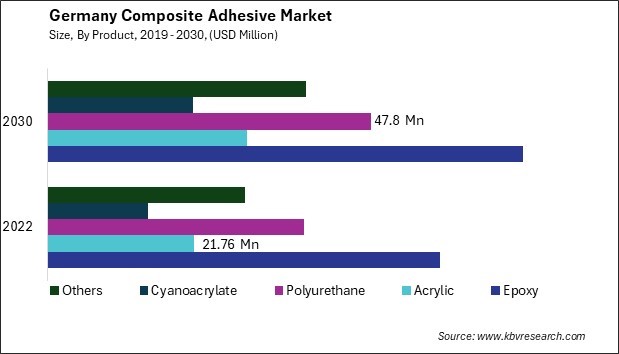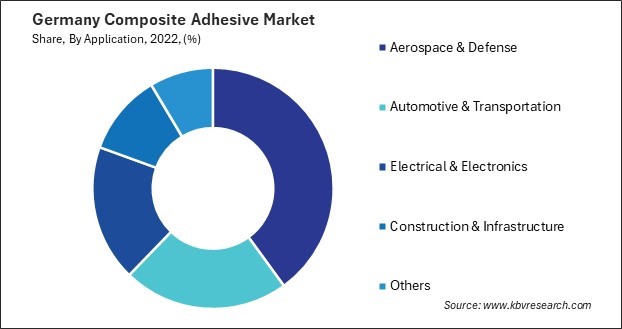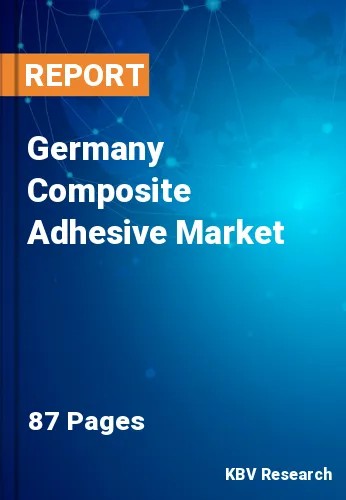The Germany Composite Adhesive Market size is expected to reach $207.47 Million by 2030, rising at a market growth of 3.2% CAGR during the forecast period. In the year 2022, the market attained a volume of 41.08 Kilo Tonnes, experiencing a growth of 2.8% (2019-2022).
Composite adhesives are essential for producing lightweight and high-performance composite structures in diverse applications such as automotive, aerospace, renewable energy, and construction. The market is characterized by a strong emphasis on technological advancements, sustainability, and the pursuit of high-quality bonding solutions that meet the stringent requirements of modern manufacturing processes.

Due to its engineering prowess and dedication to innovation, Germany is a center for cutting-edge adhesive technologies and materials. The composite adhesive market in Germany benefits from the country's strong industrial base, extensive research and development infrastructure, and a skilled workforce that drives innovation and excellence in adhesive manufacturing.
The demand for lightweight, fuel-efficient vehicles has led to increased adoption of composite materials in vehicle construction, driving the need for advanced adhesive solutions that can bond these materials effectively. The aerospace and wind energy sectors in Germany also contribute to the demand for composite adhesives, as they require high-performance bonding solutions for advanced composite structures.
Moreover, sustainability and environmental considerations are shaping the Germany composite adhesive market, with a growing focus on developing eco-friendly adhesive formulations and manufacturing processes. As the industry seeks to reduce its environmental footprint and comply with stringent regulations, there is a rising demand for sustainable adhesive solutions that offer high performance while minimizing environmental impact.
The COVID-19 pandemic has significantly impacted the Germany composite adhesive market, presenting challenges and opportunities for industry players. While disruptions in the supply chain and shifts in demand patterns have posed challenges, the industry has shown resilience and adaptability, paving the way for recovery and future growth. A greater emphasis was placed on employee well-being and safety practices in the workplace as a result of the increased awareness of health and safety measures brought about by the pandemic. Manufacturers and suppliers of composite adhesives had to implement new protocols and measures to ensure the safety of their workforce while maintaining operational continuity.
The use of epoxy composite adhesives in Germany has grown steadily across various industries due to their versatile properties and wide-ranging applications. Epoxy adhesives have garnered considerable acclaim due to their exceptional adhesion strength, chemical resistance, and capacity to adhere to a broad spectrum of substrates. As a result, they find applications in challenging sectors, including automotive, aerospace, construction, and electronics.
Furthermore, epoxy composite adhesives are suitable for a vast array of construction-related applications due to their adaptability. Epoxy adhesives are used for bonding various construction materials such as concrete, metal, and plastics, providing a durable and reliable bond that withstands harsh environmental conditions. In addition, their ability to fill gaps and voids makes them ideal for structural bonding applications in building and infrastructure projects.
The electronics industry in Germany has also witnessed an increasing use of epoxy composite adhesives for electronic assembly and packaging. Epoxy adhesives are used for bonding components, encapsulating electronic devices, and providing electrical insulation. Their excellent electrical properties, thermal stability, and resistance to moisture and chemicals make them well-suited for the demanding requirements of electronic applications. Thus, as industries continue to demand high-performance bonding solutions that offer durability, strength, and reliability, epoxy adhesives are expected to remain a key component in Germany's manufacturing and construction sectors.
Germany's aerospace & defense sector is the country's strong focus on innovation and technological advancement. German aerospace companies are renowned for their engineering expertise and commitment to developing cutting-edge technologies for aviation and defense applications. This focus on innovation has led to developing advanced aircraft, defense systems, and space technologies in high demand domestically and internationally.
Moreover, Germany's strategic location in Europe and strong industrial base have positioned it as a hub for aerospace and defense manufacturing and research. The country is home to several leading aerospace companies and research institutions collaborating on various projects, driving innovation and competitiveness in the sector. This collaborative ecosystem has facilitated the rapid expansion of the aerospace & defense industry in Germany, enabling companies to leverage each other's strengths and capabilities.
Furthermore, the increasing demand for commercial aircraft and defense systems globally has contributed to the growth of Germany's aerospace & defense sector. As air travel continues to grow, driven by rising disposable incomes and expanding middle-class populations in emerging markets, there is a growing need for new aircraft and related technologies. Germany's aerospace industry is well-positioned to meet this demand, focusing on advanced manufacturing techniques, materials innovation, and sustainable aviation solutions.
The expanding aerospace & defense sector in Germany is leading to increased research and development efforts in composite materials and adhesives. In pursuit of meeting the evolving demands of the aerospace and defense sectors, corporations and academic establishments are allocating resources toward the development of advanced composite adhesives that exhibit enhanced durability, improved performance, and reduced weight. This focus on innovation drives the demand for advanced composite adhesives that can withstand the extreme conditions and rigorous requirements of aerospace and defense applications.
Moreover, the increasing complexity of aerospace and defense applications drives the need for high-performance composite adhesives. Modern aircraft and defense systems incorporate various materials, including composites, metals, and advanced polymers, which require specialized adhesives to ensure strong and reliable bonds. Composite adhesives possessing exceptional characteristics, including thermal stability, chemical resistance, and durability, are imperative in order to fulfill the stringent performance criteria of defense and aerospace applications. Hence, this sector's growth will expedite the market's growth.

In the Germany composite adhesive market, several companies play a prominent role in supplying a diverse range of adhesive solutions tailored to the needs of various industries. These companies are known for their expertise in adhesive technologies, product innovation, and commitment to meeting the demanding requirements of composite bonding applications across sectors such as automotive, aerospace, construction, and marine.
One of the leading companies in the Germany composite adhesive market is Henkel AG & Co. KGaA, a global leader in adhesive technologies. Henkel offers a comprehensive portfolio of composite adhesives under brands such as LOCTITE®, providing solutions for structural bonding, composite repair, and assembly applications. The company's adhesive technologies are widely used in aerospace, automotive, and industrial manufacturing, where high-performance bonding solutions are essential.
Another key player in the Germany composite adhesive market is Huntsman Corporation, a multinational manufacturer of chemical products, including adhesives and sealants. Huntsman offers a range of epoxy-based composite adhesives designed for bonding advanced materials in aerospace, automotive, and industrial applications. The company is known for its focus on innovation and sustainability, developing adhesive solutions that meet the stringent requirements of modern composite bonding.
Dow Chemical Company, a prominent entity in the German composite adhesive market, is a global leader in materials science. Dow offers various composite adhesives that cater to diverse applications, including structural bonding, lightweight, and thermal management. The company's adhesive technologies are used in various industries, including aerospace, automotive, and construction, where high-performance bonding solutions are critical for advanced composite applications.
In addition to these major players, the Germany composite adhesive market includes several other companies specializing in adhesive technologies for specific industries or applications. These corporations enhance the variety and ingenuity of the German market by providing an extensive selection of adhesive solutions to meet the ever-changing demands of the composite bonding sector.
In conclusion, the Germany composite adhesive market is characterized by leading companies such as Henkel AG & Co. KGaA, Huntsman Corporation, and Dow Chemical Company, which offer diverse adhesive solutions for composite bonding applications. These companies play a crucial role in driving innovation, quality, and reliability in the Germany composite adhesive market, contributing to the advancement of composite technologies across various sectors.
By Product
By Application
Our team of dedicated experts can provide you with attractive expansion opportunities for your business.

